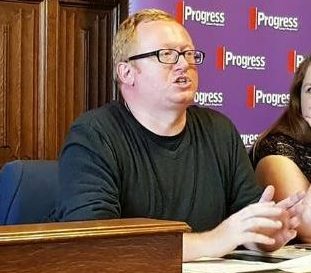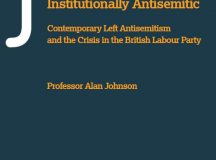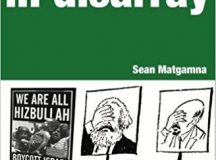While the four-year long controversy over antisemitism in UK Labour has monopolised media attention, the 2019 UK Labour party conference voted through some little-noticed one-sided policies that would severely damage Britain-Israel relations, erode the booming bilateral trade relationship and weaken the vital defence and security ties that keep British and Israeli people safe, argues Luke Akehurst.
Much has been written about the issue of antisemitism in the British Labour Party under Jeremy Corbyn’s leadership. An excellent summary is Fathom Editor Professor Alan Johnson’s report entitled Institutionally Antisemitic: Contemporary Left Antisemitism and the Crisis in the British Labour Party.
However, whilst the linkage between anti-Zionism and antisemitism has been explored in depth, and is now more widely understood than it was before 2015, there has been less scrutiny of where Labour’s actual policy stance towards Israel has moved.
Whilst the culture and atmosphere in the party regarding debate over Israel has moved dramatically and speedily to one that is one-sided and toxic, this atmosphere and the antisemitism it has carried with it has, counterintuitively, had the effect of forcing the leadership to delay and soften actual policy change on the issue.
At first glance it would be surprising that policy has moved glacially slowly, given the centrality of support for the Palestinian cause to the political identity of the Hard Left of the Labour Party, the deep involvement Corbyn has personally had in campaigning on the issue, and the radicalism of the positions on Israel historically taken by Corbyn’s closest allies.
Corbyn himself was perceived as overtly anti-Israel before he became Leader. He is a Patron of the Palestine Solidarity Campaign, which supports the BDS (Boycotts, Divestment and Sanctions) movement and is ambiguous about whether it favours a two-state or one-state solution. He was also a signatory of the 2002 Cairo Declaration ‘against US hegemony and war on Iraq and in solidarity with Palestine’ and was – until his election as leader – National Chair of the Stop the War Coalition, which has been heavily involved in street protests against Operation Cast Lead and Operation Protective Edge. He had referred to representatives of Hamas and Hezbollah as ‘friends’ (a phraseology he now excuses as ‘diplomatic language in the context of dialogue’). Corbyn’s inner team all have a history of support for the Palestinian cause – including BDS.
He inherited a compromise position on Israel, adopted by his predecessor, Ed Miliband, which was fractionally to the left of the position taken by the Blair and Brown governments. This consisted of:
- Support for the two-state solution.
- Opposition to BDS
- Support for air strikes in Gaza during Operation Protective Edge but condemnation of the IDF ground incursion.
- Support for a vote in the House of Commons in October 2014 in favour of a unilateral declaration of Palestinian statehood.
In the Labour Manifesto for the 2017 General Election, despite already having firm control over the drafting process, which was led by Andrew Fisher, a key Corbyn ally and his Head of Policy, the wording on Israel and the Palestinians was left almost identical to that in 2015, carrying this text:
Labour is committed to a comprehensive peace in the Middle East based on a two-state solution – a secure Israel alongside a secure and viable state of Palestine. There can be no military solution to this conflict and all sides must avoid taking action that would make peace harder to achieve … Labour will continue to press for an immediate return to meaningful negotiations leading to a diplomatic resolution.
The only change was the insertion of a new penultimate sentence reading ‘That means both an end to the blockade, occupation and settlements, and an end to rocket and terror attacks.’ So the fundamentals of the Miliband formulation were left untouched, and even the new text had a balance to it.
At the 2015 and 2016 Labour Party Annual Conferences, there was no debate about Israel and the Palestinians for the simple reason that anti-Corbyn delegates had a majority of the constituency delegates and blocked it from being chosen as a topic for debate in the ‘Priority Ballot’. By 2017, Corbynites had a strong majority among constituency delegates but their organisers chose not to recommend that they vote for the topic to be debated. We can speculate that this was a tactical decision driven by the prominence of the debate around antisemitism at that conference, both off conference floor with the creation of Jewish Voice for Labour (a grouping mainly consisting of anti-Zionist Jews who dispute the extent and definition of antisemitism in the party) and on conference floor with a rule change to make antisemitism a disciplinary offence. Perhaps the conference’s political managers from the Momentum faction and the Leader’s Office feared speeches during a Palestine debate would add fuel to the media story about antisemitism.
In 2018, the Corbynite grip on the composition of the constituency delegates grew tighter. Before Conference there was a continuation of the internal debate about antisemitism, culminating in the adoption of the IHRA Definition and all its examples, after a lengthy and reputation-damaging rear-guard action by the National Executive Committee. But this time Momentum urged Corbynite delegates to vote for a debate about Palestine as one of the four topics chosen by constituency delegates. The content of the motion focussed on UNRWA and the casualties on the Gaza Border, and resolved ‘to call for an independent international investigation into Israel’s use of force against Palestinian demonstrators; a freeze of UK Government arms sales to Israel; and an immediate unconditional end to the illegal blockade and closure of Gaza.’ It thus moved Labour’s policy one step further by calling for an arms embargo. Ironically this merely saw the policy on Israel catch up with the arms embargo stance on Saudi Arabia that had already been in the 2017 Manifesto.
The 2019 Party Conference: New Policy
In 2019, there was never really any doubt that there would be another debate on Palestine because at the 2018 conference the rules on what could be debated had been significantly relaxed. A requirement for motions to be ‘contemporary’ (i.e. relating to events in the couple of months prior to the conference) was dropped, and the number of topics chosen for debate by each of the constituency and trade union halves of the conference increased from a restrictive four each, a number which historically had been used to block debates the leadership wished to avoid, to ten each.
The 250 words of the motion that was passed were carefully calibrated not to appear extreme. They never mention the word boycott. But they subtly gave the green light to a number of very problematic concepts, and took Labour another step towards the overt anti-Israel stance of Corbyn himself.
The motion claimed: ‘Recent actions by US and Israeli administrations are destroying prospects for peace in Palestine’ – a dog whistle message that two states is no longer a viable proposition.
It said that ‘Labour … has a special responsibility to redress the ongoing injustices against the Palestinian people … because of the role Britain played as a colonial power’, implying that a Labour Government will take an interventionist role.
The narrative it presented about Israel’s creation was wholly one-sided and negative, highlighting only Palestinian suffering and implying Israel was created through ethnic cleansing ‘during the 1948 Nakba when Palestinians were forcibly displaced from their homes’.
The Conference committed to oppose any peace deal ‘not based on international law and UN resolutions recognising … [Palestinian] rights to … return to their homes.’ By making the ‘right of return’ for all Palestinians to pre-1967 Israel a condition for support of a peace deal, as the resolution did, the party signalled it is no longer really interested in the ‘two states for two peoples’ solution as the ‘right of return’ implies both states would have an Arab majority. It is a demand that Israel could never sign up to without committing national suicide. Is Labour really suggesting that approximately five million Palestinian descendants of refugees could move to live in Israel?
The position on an arms embargo was actually more nuanced than that passed in 2018: ‘stopping any arms trade with Israel that is used in violation of the human rights of Palestinians’; but the new step was to include wording that would allow Labour to put a targeted boycott of settlement produce into its manifesto: ‘To adhere to an ethical policy on all UK’s trade with Israel, in particular by applying international law on settlements’.
Most alarmingly, it provided scope for a wider boycott policy if trade agreements with Israel do not attach unspecified conditions about Gaza and the West Bank: ‘rejecting trade agreements with Israel that fail to recognise the rights of the Palestinians.’ This has teeth as post-Brexit, trade with Israel would be controlled by the UK bilaterally, not conducted under EU rules. It introduces an ill-defined ethical test that could be used to veto any or all trade deals with Israel.
What is missing from these resolutions speaks volumes. No recognition of the Jewish right to self-determination. No mention of Israel being a Jewish state. No mention of Jewish suffering through antisemitism and genocide creating the need for statehood. No mention of Israeli victims of war, terrorism and missile attacks. No recognition of Israel’s legitimate right of self-defence to protect its citizens.
The one silver lining is that policy passed at conference does not automatically make it into the Labour General Election Manifesto; it has to be agreed by senior party figures at a special ‘Clause V’ meeting, where some moderates still sit. Whatever happens next, Labour conference 2019 adopted a set of policies that would severely damage Britain-Israel relations. If they were implemented they would erode the booming bilateral trade relationship and weaken vital defence and security ties that keep British and Israeli people safe.
However, it is still a long way short of the kind of politics on Israel espoused by Corbyn and his key allies before they controlled the Labour Party – targeted rather than full boycotts, no real move against the stance on a two-state solution, certainly no expressions of solidarity with Hamas and Hezbollah.
It is difficult to know whether anti-Israel activists will privately feel pleased by the policy movement they have achieved so far, or let down by it not being nearly as radical as they would have hoped for when they campaigned to get a national patron of PSC elected as party leader.
The relative caution of the current policy stance compared to the pre-2015 public views of the party leadership, and the painstaking slow process to get to it, reflect two factors:
- In power within the party, Corbyn and his allies and advisers have had to pragmatically manage the party and its reputation, and have backed away from some of the more radical stances they held as backbenchers to avoid fighting internal and external battles on too many fronts. Israel is not the only policy area where they have tried to avoid a full scale row. They have not tried to change party policy on the Trident nuclear deterrent or NATO, they have softened their economic policy to make it appear more ‘prudent’, and they have actually adopted a tougher policy on immigration than Ed Miliband had. Starting from a far more left-wing place, they have triangulated just like Blair did.
- The explosion of antisemitism as an issue in the party and the media, caused by the seizure of power in the party by people with a very radical anti-Israel history, has forced the leadership to go slow on Israel policy in case a radical shift towards BDS was either interpreted as inspired by antisemitism or caused a further bout of antisemitism cases.
But even though the policy adopted isn’t as radical as it would be expected to be given Corbyn’s own history on the issue and those of his core activist supporters, it is still the most radical anti-Israel platform adopted by a major UK political party, and still a significant break from the pre-2015 cross-party consensus.
The 2019 Party Conference: New Culture
But the counterpoint to the second of these explanations is that for Zionist Jewish party members, the two motions on Israel and the rally-like way the debate about them was conducted felt like deliberate revenge for the retreats the leadership had had to make on the antisemitism rules and IHRA; it all felt like a public statement of impunity.
As well as the hard policy decisions, it is important to grasp too the political culture that surrounds the passing of these two consecutive policy motions.
Anti-Zionism has been endemic as a political theme at conference since 2016, and it has manifested itself in antisemitic forms on the fringe. In 2019, there was a fringe meeting featuring high-profile people expelled from Labour for antisemitism claiming that the charge had been made up to stop them talking about Israel; another fringe meeting featuring a skype message from boycott movement leader Omar Barghouti, a man who thinks Israel should not exist and was denied a visa to enter the UK by the Home Office; posters of cartoons showing Netanyahu flying an aircraft labelled ‘the lobby’ firing missiles labelled ‘defamation’ at Corbyn; newspapers being handed to delegates calling Israel a ‘racist endeavour’ in direct contravention of the IHRA definition of antisemitism; the ubiquitous wearing of Palestine Solidarity Campaign (PSC) lanyards, endorsing an organisation that supports boycotts and is ambiguous about the two-state solution.
The 2019 motion was debated in the midst of a tumultuous fight over Brexit. No one got the chance to speak against the motion, six speeches were made in favour. One of them got a standing ovation for saying she (not a Jew) had never experienced antisemitism in the Labour Party. Palestinian flags were waved, as in 2018, creating the feel of a rally for one side, not a genuine debate about how to resolve a conflict. You might ask how did this get chosen as the priority for debate? Why is it that two years in a row, when delegates hardly choose any foreign policy subjects to debate, they have had a pretty repetitive debate about Palestine?
It is difficult to imagine when and how Labour might ever get to have a rational, balanced debate about Israel on conference floor.
The issue has becoming a factionally polarising one, with support for Israel increasingly seen as a metaphorical lapel badge, implying hostility to the leadership. Whilst there are occasional Blairites like Ben Bradshaw who identify with the Palestinian cause, the idea of someone being a Corbynite and passionate Zionist is no longer sustainable. There is no modern Ian Mikardo or Richard Crossman figure – very left-wing but pro-Israel. Momentum founder Jon Lansman is articulate in calling out antisemitism, and seems genuinely committed to a two-state solution, but has not demurred from the policy changes on Israel. The small Workers’ Liberty group have a sophisticated and intelligent stance on Israel but for this and other reasons are treated as pariahs by other Corbyn supporters.
The Labour leadership could move back towards the centre of the party if Corbyn loses an imminent Brexit-dominated General Election. But with the unions locked into policy positions identical or more radical than the party’s stance; and a multitude of fronts, not least internal antisemitism, on which Labour’s credibility would need to be restored, would a new leader expend any political capital on prioritising reversing the policy changes on Israel?







































This article is of interest in that it tries to give a balanced view on the reality of Labour attitudes on anti-Semitism.. However, what it does not do is to give a view on the mainstream part membership and how they see such an issue. This is where the test comes for the reality. Like many ‘intellectual’ sounding articles, it glosses over the real attitudes, with a respectable looking veneer. hence the danger. The reality looks to me a lot more serious.
The UK Labour party is made up of people who have an axe to grind against anyone who is ‘successful’ in whatever field they operate within. Jews, and increasingly the Israel state are successful. Add into the mix of some of the pernicious myth, such as ‘deicide’ and that revolving around the ‘matza’ and immediately there is a toxic mix that generates prejudice that becomes unstoppable. Look at the formation of Nazi Germany. Anti-Semitism became rampant among the population at large. Hence the Nazis got away with so much brutality. It could happen in the UK. Complacency here would then be disasterous.